- Home
- Priscilla Royal
Justice for the Damned Page 15
Justice for the Damned Read online
Page 15
“Our faith demands it,” Beatrice said.
Thomas agreed. In the weak light, his face was white.
Chapter Twenty-Three
Eleanor hoped the tranquility of the priory gardens would ease the pain this violence had brought to her soul. On those occasions when she was able to fill her spirit with silence, she knew that her position as prioress forced her into the brutality of a secular world far more than was good for any one who had sworn to serve God alone. But He demanded special sacrifices from each follower, and her particular oblation allowed many others the encloistered peace required for concentrated prayer. “We may not quarrel with the road we are set upon,” she reminded herself. “We must only pray that God grace us with compassion and understanding.”
If there was ever a time when she needed both, it was now. Eleanor had left the chambers with a mind aching for answers. Never before had she felt so confused by events, by contradictory perceptions, and by the number of people who might be involved.
What questions would bring truth to the fore in this most complex maze of ghosts, murder, Psalters, and intentions? There was some connection she was failing to see and almost nothing she could dismiss.
Wulfstan seemed to have no enemies, despite his lawless years, and she could not set aside his equally long record of reliable, honest labor. His son may have led others to sin, but her aunt, who surely knew him best and agreed he might be a thief, thought murder beyond him. Were father and son involved in a plot to steal the Psalter, as she suspected? Was the quarrel but a drunken spat?
Who was the ghost? Was it a boy playing the fool or a killer in disguise? Mayhap Sayer? Was the spirit a woman or a man dressed up to look like one? Perchance Jhone, seeking to frighten both village and priory into reconsidering the condemnation of her childhood friend? As unlikely as that seemed, it was not something Eleanor could set aside either. And did it matter whether the shape was judged to be a queen or a local spirit back from Hell?
And what of this Bernard, a man in need of money to win the woolmonger’s daughter and a profitable business? His name had not even been mentioned as a suspect, but she wondered if it should be. Was he a dreaming boy who truly loved his Alys, or a scheming thief who sought to sell a stolen manuscript and thus gain what he could not earn as a merchant of gloves? Even if Sayer and his father had planned the theft of the Psalter, they needed someone to sell it for them, a man who could travel with ease.
The prioress pressed her fingers against her brow. Her courses may have ceased, but a familiar dull ache was now starting over one eye. She must ask Anne to prepare that feverfew potion which helped with the blinding headaches she often suffered.
Suddenly, she heard a noise and looked up.
A crow hopped to a landing on the path in front of her.
If this was the bird nesting near the library, the creature must feel more certain of her brood to leave it unguarded. Or was it stealing just a few minutes away from the high-pitched chirping of demanding and featherless infants? Eleanor chuckled at the thought. The bird was no different from any other mother.
She stood very still, finding delight in watching the bird totter along the path as if seeking the quiet to be found between rows of flowering bushes and budding plants. Most called crows ungainly things, their rolling gait like that of drunken men, their feathers askew as if they cared naught for appearances, but Eleanor did not agree. This creature did not remind her of a drunkard or some slovenly woman. Instead, it was like any young mother, stiff and pained from birthing, with little time now for the preening of her maiden days.
Many also hated these birds for their sooty color, calling them Death’s servants or Satan’s fowl, but Eleanor had always liked their clownish ways, wondering if God had made them dark of hue to remind mortals that laughter must be found in sadness. Or else, she suddenly thought with some irreverence, they contained the souls of jesters condemned to Hell for telling bad jokes in the king’s court. She raised a hand to cover her laugh. The thought was impudent, but she knew her aunt would enjoy the image as much as she.
Her gesture caught the bird’s attention. The crow turned and studied the Prioress of Tyndal, its bright black eyes gleaming like tiny polished pebbles. With a raucous and annoyed caw, it spread its wings and flapped back in the direction of the tree.
Eleanor sighed with regret, raising a hand in apologetic farewell as if the bird had been an acquaintance with whom she had shared a few pleasant words before innocently saying something to offend. “At least it succeeded in turning my thoughts from murder,” she said, bending over a prickly evergreen shrub with fragrant yellow blossoms.
How delicate the petals, she noted, yet how fiercely protected by the sharpness of the bush. She laid two fingertips on a flower with caution. Even soulless plants defend their delicate offspring, she realized. What a miracle motherhood was, turning simple shrubs and weak women into creatures capable of the most remarkable feats.
Hadn’t Sister Beatrice just wrought a maternal miracle? Were it not for her aunt’s loving cleverness, Eleanor knew she might have succumbed to Death’s charms out of indifferent weariness. Yet she had gained strength in the last few days, no longer falling asleep after dinner and requiring someone to wake her for prayer. Look at how much she had walked today without losing breath or growing numb with fatigue.
As she continued along the path, listening to the soft whoosh of green leaves rising and falling against each other in the sweet-smelling breeze, she remembered thinking, after her fever broke, that those who approach death begin to long for it even though they will leave loved ones. Eleanor had looked forward to dying, deciding that Tyndal could do just as well under Sister Ruth and grateful that she would be freed from the lust she suffered for Brother Thomas. Yet Sister Beatrice had teased her spirit back to the earthly life with ferocious determination. Like any good mother, her aunt knew well how to save a child from danger.
In the distance, the crow cawed loudly from her nest.
Eleanor raised her hands to her mouth. “O slow-witted woman,” she gasped. “Surely God sent that crow as messenger, yet I have been standing here, so absorbed by selfish thoughts of my wretched self that I was blind to the insight He granted me.”
Picking up the hem of her robe, she ran from the cloister gardens.
The priory bells rang out with joy for prayer.
Chapter Twenty-Four
“Come join me, monk!” Sayer sat on the library roof and waved his hammer. “You will feel closer to God.”
“Come down to earth,” Thomas countered, unable to hold back a grin. Then a heavy darkness settled around his heart. “I want to talk to you.”
“I have work to do and what light remains is precious.” He gestured for Thomas to go inside. “There is a way to the roof up some stairs. At the top you will find an opening that leads onto the scaffolding. Once there, I will help you climb to a seat, and we can talk while I continue at my task.”
“I have not your firm footing.”
“Afraid of dying, monk? What sins do you fear might send you to Hell if you fall unshriven?” Sayer’s smile suggested he was jesting, but his tone did not match the look.
Thomas recoiled from the blow to his honor. If the man was suggesting he was a coward, he would prove otherwise. “Which stairs am I to climb?”
The steps were steep, and the window through which he edged was small. Now as he balanced himself on the narrow scaffolding and stared at the sharp angle of the roof, Thomas asked himself whether a true monk would have surrendered his pride and turned down Sayer’s implied dare. How often did he betray his insincere calling in just such ways?
Whatever the roofer’s intent, he showed gentle courtesy by helping the monk climb the steep pitch to a safe place. Once settled in, Thomas gazed at the view and understood why some envied soaring birds. From here he could see beyond the walls and across the river to the strange mounds the monks mentioned only in hushed tones. The village was
also on the other side, quite tiny from this great height and filled with bustling miniature people. Do we look that small to God, he asked himself.
“You have fallen silent, monk. I thought you wanted to talk with me.” Sayer raised his hammer with a flourish and whacked a new nail into the slate patch.
“I wonder at what a man can observe when raised higher than he might otherwise be. Now I see why angels have a far greater understanding of the earth from their vantage point in Paradise.” Or so Thomas decided he might have been thinking if his eyes had not slipped from contemplating the heavens to Sayer’s muscular stomach. He looked away.
“A most philosophical monk. Surely you did not wish to talk of angels with me, for I shall confess I much prefer the feel of the earth than any angel’s breath.” Sayer studied Thomas with mock gravity.
“Where were you last night?” The monk cursed himself for such an unsubtle question. He should tease the truth from this man, not bludgeon it.
“Surely anything you might need me to do for you can be done tonight.”
“I am afraid to come to the inn. The ghost has struck again. We had a murder here.”
Sayer froze, then dropped his hammer.
In silence, the two men watched the tool tumble to the ground.
“Who died?”
“Brother Baeda.”
“I grieve.” Sayer swiftly rubbed at his eyes. “He was a virtuous man.”
“You knew him well, did you not? So well, in fact, that he told me with what delight he had answered your many questions about the Psalter belonging to Prioress Ida.”
Shifting his crouch, Sayer stared down at the distant ground.
“Your interest both amazed and pleased him.”
“I may be unlettered, Brother, but I am not stupid.”
“I do not understand what you mean.” Thomas cursed himself again. The tips of his fingers burned to touch the man. He hid them in his sleeves.
“I shall rephrase: I am no fool. Do you wish to cast suspicion on me?”
“I meant no such thing! Surely you were elsewhere last night. At the inn? With many witnesses?”
Sayer rose and balanced himself with care. His face reddened. “I was enjoying what you have foresworn, Thomas of Tyndal, and that is more than you need to know.”
“A witness!”
“None that I will name.” He turned away and eased himself from the roof to the scaffolding.
“Wait!” Thomas called out. “I cannot get down from here.”
“Find your own way out of your predicament, monk. I shall not help you.” The man stood on the scaffolding and glared at Thomas, but his expression soon softened. “Although I believe you have some reason for wanting to call me Cain and mark me for his deed, I would not have you die here from your womanish fears.” He gestured with a mocking toss of his hand. “Slide on your belly like a snake, and you will slip into the scaffolding like a birthing babe.”
Thomas reached out his hand, but Sayer had already left.
Chapter Twenty-Five
Eleanor sped through Amesbury at such a determined pace that her two attendants were left some distance behind. In a dutifully courteous but clearly anguished tone, one cried out a plea for her to wait. She stopped and, turning, saw a plump young merchant emerge from a path between two houses.
“I am Bernard the glover, my lady,” he said in warm greeting. “Mistress Alys told me what comfort you have been to her family after this tragic murder of her uncle.”
“Grief is part of the human condition, good sir, but God never intended it to come without His comfort.” Eleanor’s suspicion of the man was briefly tempered with sympathy for young lovers. If he knew of that very recent visit, he and Alys had managed to keep in contact despite Mistress Woolmonger’s probable and disapproving watchfulness.
“Are you returning to visit Mistress Jhone?” he asked, folding one hand over the other before resting both on his heart.
“Today I go to Mistress Drifa’s house.” With some amusement, Eleanor noticed that his gesture succeeded in showing off, to much advantage, the hand-stitching on the back of his glove.
“Alas, poor Wulfstan!”
His words might have been spoken in a tone more appropriate to a monk in a holy day pageant, but Eleanor sensed no hypocrisy. “Did you know him well?” she asked, uncomfortably aware that something insistent had just bitten her memory like a hungry flea.
“Since he was Alys’ uncle...” The man’s concentration wavered. His eyes stared into the distance.
Eleanor suspected that distraction was caused only by the word Alys. “Thus dear to her, I am sure, and a man quite without enemies?” To her dismay, whatever the gnawing thing was, it had vanished like the ghosts haunting Amesbury Priory.
Bernard blinked. “I believe he had none.” His eyes focused again on the prioress.
“Although I had understood he was a poor man who labored in the priory fields, I have learned that his widow and children were left some land. What noteworthy good fortune! Or was he possessed of a hidden but remarkable prudence?”
“Everything he gained went to benefit his family, my lady. Whatever tales you may hear, let me assure you that I believe, along with most in our village, that he repented any sins long ago.”
“No ancient quarrels with former companions who might have held a grudge when Wulfstan chose a different tune for his dance?”
Bernard laughed. “Or else his sinful ways caused little harm to those in Amesbury, as he himself claimed.”
“And does the village consider what his son has been doing harmless as well?”
The glover’s expression faded to one more vacant of meaning.
“I ask only to understand what danger Wulfstan might have courted that could have led to his death.”
“I am not sure of your meaning, my lady.”
“Come, Master Glover, I cannot imagine you have not heard that Sayer arranged for agreeable women and strong drink for any monk who leapt the priory walls. This is no boyish prank. It is against God’s commandments. I must ask if Wulfstan joined with his son in this particular and recent disregard for the law.”
“God is a far sterner sheriff than the man sent by the king, I fear. King Henry may turn his thoughts from the demands of secular rule whenever the bells ring for prayer, but our sheriff finds the cry of his hunting dogs more compelling. Wulfstan feared God’s justice more than the king’s law and with good reason.”
“So Wulfstan’s sins were counter only to the king’s edicts while his son’s offended only God?”
“Please, my lady, I am a glover, not a man learned in the art of debate! All I can tell you is that Wulfstan tried to honor the lords of both earth and heaven in his last years. He may have associated with robbers, but, after his wife persuaded him to reform, he lived within secular law. As for details of his past, the village chose to know as little as possible should anyone ever be called to testify. The merchants affected, you see, were never local men.”
“If Wulfstan’s past sins have been cleansed and he has not fouled his soul with new ones, I have no desire to delve into any links to lawless men. I do, however, have both the right and duty to inquire into ghosts, creatures that plague monastic peace for supposed sins against God and which may have turned to killing. The priory has suffered two deaths. Wulfstan was a laborer on monastic lands. Brother Baeda was a monk.”
“Brother Baeda?”
“Last night he was found murdered in the library.”
“God forgive us all!” Bernard’s cheeks blanched to a wan pink, and he staggered back a step. “Disinclined to action or not, the sheriff must be summoned. We have no other choice.”
“He has been delayed.”
The glover grimaced with apparent frustration. “This news does not surprise me, but what else can we do?”
“You may have answers to my concerns.” She waited for a response, debating how frank she should be in her ques
tions. If he were involved, the direct approach would gain her naught. The indirect, on the other hand…
Silently, he nodded.
“Since his father is innocent of offending God’s law, I thought Sayer might have followed his sire’s example and longed to atone for his own evil ways. What might you know of this?”
Bernard’s eyes narrowed. “Again I fail to understand your question, my lady.”
“If the spirits have turned murderous because of some offense committed against God, the son’s especial sinning may be connected to these deaths. If Sayer is truly repentant, he might provide information that will protect the priory from further violence.”
“I am not the one to ask about his thoughts, actions, or ability to do what you seem to wish.” He looked up at the sky, his expression a study in reluctance. “You had best ask his mother or else Sayer himself, for I do not know the man well.”
“I shall,” she replied.
“I fear I am late back to my shop.”
“It would be discourteous to detain you further.”
Bernard bowed abruptly and, without further word, quickly walked away.
The man lies, Eleanor decided, although he may have fair reason. Her mind insisted that his motive was malicious, but her heart was not as sure. Was he protecting someone? If he loved Alys, he would wish to shift all suspicion from her family, including Cousin Roofer. On the other hand, Bernard had not actually defended Sayer as he had Wulfstan. He had claimed ignorance of Alys’ cousin and avoided direct response to any questions about the man.
Eleanor frowned, as her mind chased itself in circles, but suddenly brightened as she grasped the thing nibbling at her memory. Was it not yesterday, crossing the Avon after visiting Mistress Jhone, that she had seen the glover in merry conversation with another man?
Treading on the heels of that recognition was a chilling thought. Unless Bernard had inherited a more profitable trade than would seem to be the case, he would not have many apprentices and certainly not one of such long standing that he would be of much the same age.

 The Twice-Hanged Man
The Twice-Hanged Man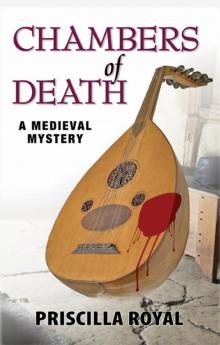 Chambers of Death mm-6
Chambers of Death mm-6 Forsaken Soul
Forsaken Soul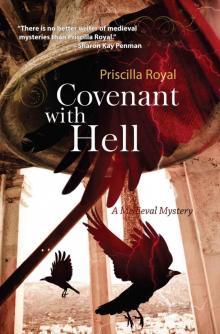 Covenant With Hell (Medieval Mysteries)
Covenant With Hell (Medieval Mysteries)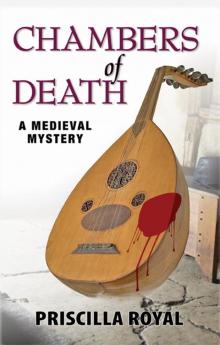 Chambers of Death
Chambers of Death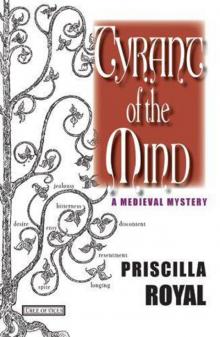 Tyrant of the Mind
Tyrant of the Mind Wild Justice
Wild Justice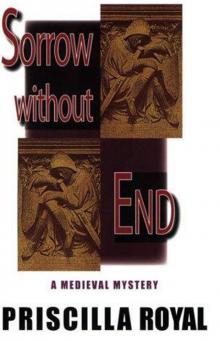 Sorrow Without End
Sorrow Without End Wine of Violence
Wine of Violence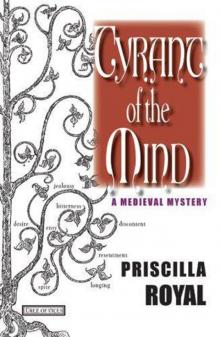 Tyrant of the Mind mm-2
Tyrant of the Mind mm-2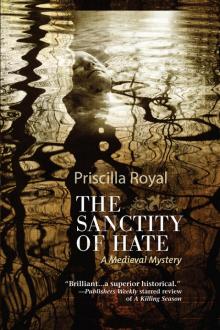 The Sanctity of Hate
The Sanctity of Hate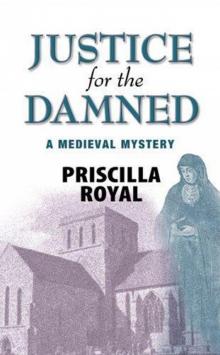 Justice for the Damned
Justice for the Damned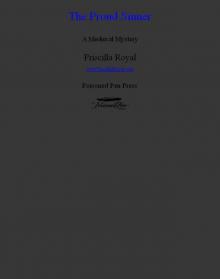 The Proud Sinner
The Proud Sinner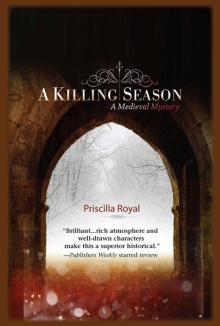 A Killing Season mm-8
A Killing Season mm-8 Forsaken Soul mm-5
Forsaken Soul mm-5 Valley of Dry Bones mm-7
Valley of Dry Bones mm-7 Valley of Dry Bones
Valley of Dry Bones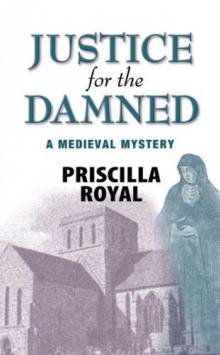 Justice for the Damned mm-4
Justice for the Damned mm-4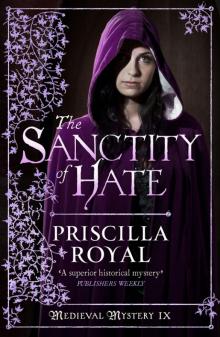 Sanctity of Hate
Sanctity of Hate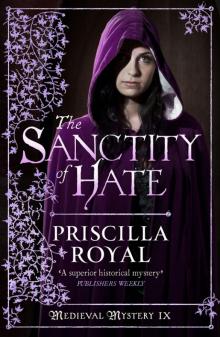 Sanctity of Hate mm-9
Sanctity of Hate mm-9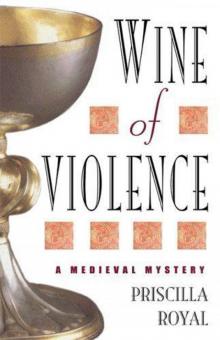 Wine of Violence mm-1
Wine of Violence mm-1